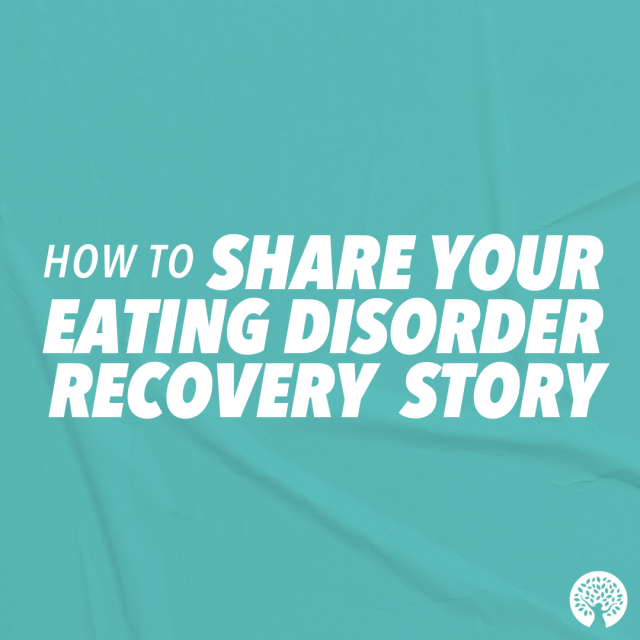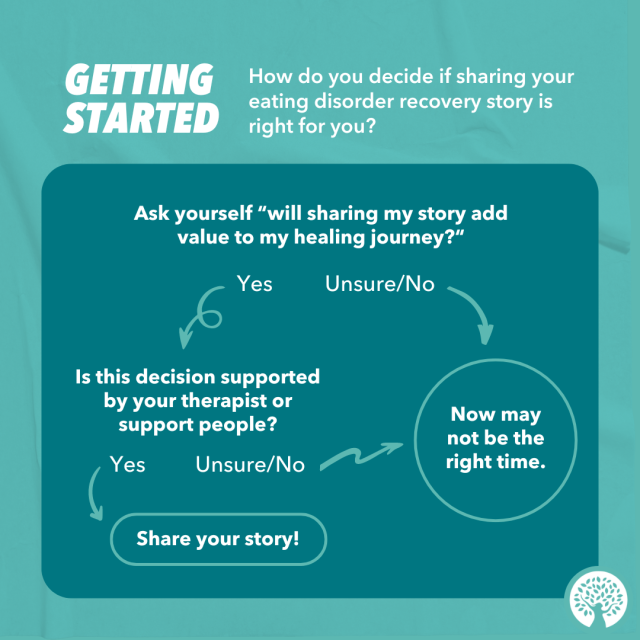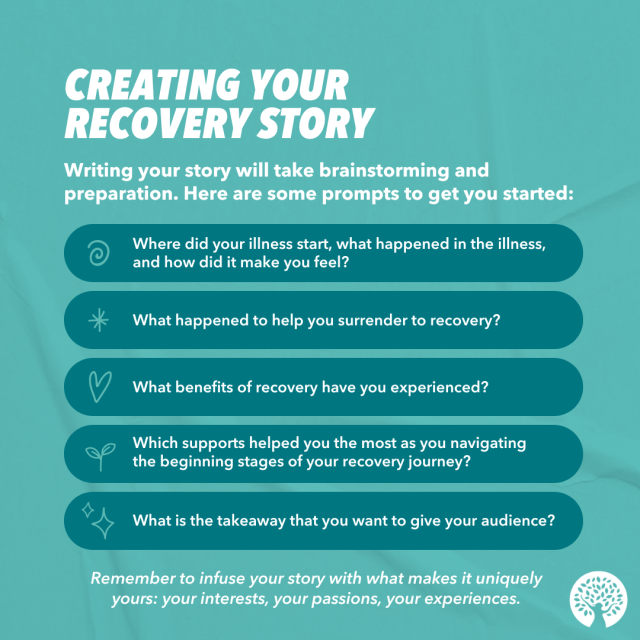How to Share Your Eating Disorder Recovery Story
Author:
Cara Spagnola, MSW, LISW, LCSW

Gone are the days where mental health and medical professionals have the only say in what recovery may be like. And for good reason.
Hearing stories directly from those in eating disorder recovery — those experiencing the actual symptoms and navigating treatment, barriers and resources — has brought a wealth of understanding, knowledge and compassion to the field and discussions around mental health. Stories of people’s lived experience in eating disorder recovery provides hope to others that living a meaningful, values-driven life is possible and that recovery is achievable.
If the thought of sharing your story -- or even writing your story -- has been on your mind, you may have a lot of questions. We are here to help guide the way and make the process a little less intimidating.
Getting started
How do you decide if sharing your eating disorder recovery story is right for you? You may want to ask yourself: Will sharing my story add value to my healing journey? If you answered, “yes,” is this decision supported by your therapist or support people?
As you’re contemplating this next step, two of our ERC alumni and Recovery Ambassador Council members offer how their own experiences of sharing their stories have benefited them.
“Sharing my eating disorder recovery story has helped me process what my life was like growing up, in my eating disorder, and as I’ve progressed in my recovery. Sharing has helped me accept what my story is, has helped me see the difference in my life before recovery and now as I live in solid recovery. It has been a way to see and focus on the things I’ve learned in recovery and want to pass on to others that may need to see that recovery is truly possible. Sharing my story has lessened the shame I have often felt with my story. It has helped me find my voice that I was so scared to use. Sharing my story has been a way to see meaningful and good things come from the little girl I was that cried herself to sleep. I live every day with gratitude and want to share hope with those who need it so much.” - Kelli Evans
“It was near the end of my program with ERC that I knew that I wanted to open New Beginnings Motivation (NBM). The pain that I felt from the loss of my brother was intense. I took that pain and turned it into a positive power source because I didn’t want anyone to feel alone, and that was when I decided to begin my healing journey. For me, sharing my story created the confidence and allowed healing after the death of my brother. Even though I think of him every single day, I can feel that he’s with me as I’m sharing my story. Taking that negative power source that hurt when I lost him and flipping it to a positive power source by making a difference allows me to leave a legacy for my nephews and nieces and godchild.” – Dave Vrablik

Creating your eating disorder recovery story
Writing your story will take brainstorming and preparation. Here are some prompts to get you started.
- Where did your illness start, what happened in the illness, and how did it make you feel?
- What happened to help you surrender to treatment and recovery? Why was treatment important?
- What benefits of recovery have you experienced?
- Which supports helped you the most as you transitioned in and out of treatment or levels of care?
- What is the take-away that you want to give your audience? Infuse your story with what makes it uniquely yours: your interests, your passions, your experiences.
ERC alum Kelli provides these tips and encouragement for anyone looking to share their story:
“Have someone help you write out your story and talk about what parts of your story you want to share and what parts you don’t want to. It is then helpful to organize your story into an outline. Start with small audiences and have someone there with you that you trust, and you can feel support from while you are sharing. One way to begin in a safe way of sharing your story is to write blogs that include parts of your story before you are comfortable sharing verbally and face to face. Don’t try to memorize your story that you want to speak about. Focus on three or four points you want to make sure you include. This can really help decrease your anxiety of trying to remember what you want to say. Also, it’s more than fine to have a card you reference to remember your most important points.”

What you may not want to share
While aiming to be authentic to show how you were truly suffering at your worst and how well you are doing now, you may feel tempted to share details that are a testament to your journey and all that you have overcome. However, some details could be unhelpful or triggering to others. If you have experienced an eating disorder, avoid giving specific numbers, such as amounts of food, duration of exercise, calories or body weight. Avoid labeling foods as good, bad, healthy, unhealthy or junk. If you experienced eating disorder behaviors, forms of self-harm or suicidality, avoid giving specific details around these experiences or incidents.
Your story is unique and valuable, and everyone’s treatment and recovery journey looks a little different. When sharing your experiences, use “I” statements, such as “what I found helpful was ___” or “for me, I needed to ____.” Feel empowered to share what helped and worked for you, but do not give clinical recommendations or advice. Instead, refer people back to their own therapist or treatment team to navigate their treatment plan or next steps. If someone wants to know what path they take, direct them to their own treatment team for recommendations and guidance. If they need referrals for outpatient treatment, please direct them to [email protected].
Additional tips
- Boundaries are important. Think about which topics or details are off-limits and you don’t want to discuss. If you are speaking at an event and someone asks you a question that makes you uncomfortable, you don’t need answer it. You can say “I don’t think answering that will be helpful” or “I think I’ve shared enough on that topic.” Your privacy and safety is important, so do not provide your personal contact information.
- Find meaningful ways and rituals to take care of yourself. While sharing your story can be incredibly rewarding and empowering, it can also bring about a tangle of other emotions: anxiety, lingering shame, discomfort and “vulnerability hangover,” to name a few. You can include grounding techniques or spiritual practices, and prioritize sleep before and after. ERC alum Dave takes care of himself this way: “I have my support team on speed dial or with me so that if it gets rough, we create an environment where I can go and check in with myself. But also after a speaking engagement is done I go home or to the hotel and take a hot shower to decompress and begin breathing techniques.”
- You can always say no. ERC alum Kelli encourages you to “always keep in mind that you are allowed to say yes or no to speaking opportunities. I often thought I needed to speak at every opportunity that was offered to me. It’s important to know how much speaking is healthy for you. I needed help from people around me to learn to say no and not feel guilty about saying no. Remember why it is you want to share your story, and it is more than okay to take an extended break from sharing your story with others.”
- Remember your main message: Recovery is possible -- and worth it!
If you are an ERC Pathlight alumnus and are interested in sharing your story, we’d be happy to chat with you. Please send an email to [email protected] and your Alumni & Community Outreach Liaison will be in touch.
Struggling with an eating disorder?
One conversation can make all the difference. Connect with us today.
Get Help NowConnect With Us
Written by
Cara Spagnola, MSW, LISW, LCSW

